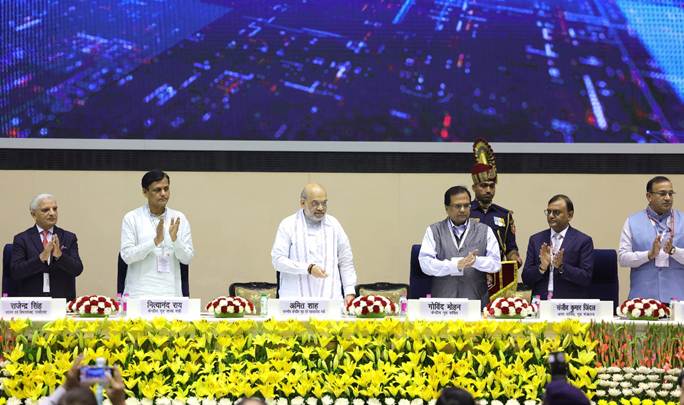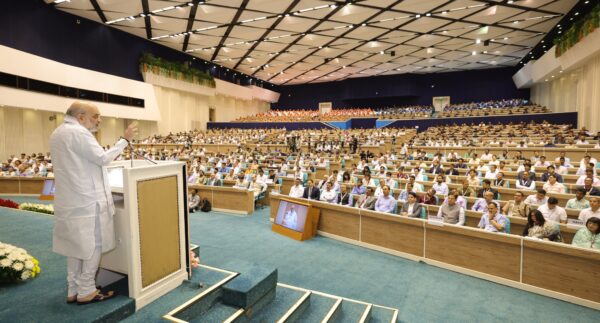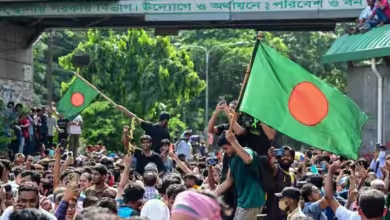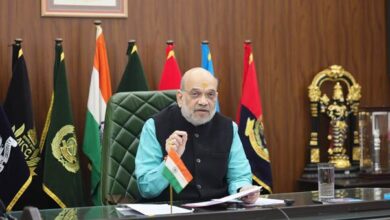India Aims for Zero Casualty in Disasters: Amit Shah

New Delhi: Union Home Minister and Minister of Cooperation Amit Shah emphasized the importance of a unified approach to disaster management, addressing the Annual Conference of Relief Commissioners and Disaster Response Forces of States and Union Territories in New Delhi.
Amit Shah highlighted the significant progress made in disaster management under the Modi government, including a shift from relief-centric to a comprehensive and integrated approach.
Over the past two years, workshops of all agencies related to relief and disaster management have been brought under one platform, adopting a ‘Whole of Government’ approach to create a think tank to work in a unified manner. This has been helped address shortcomings and prepare the entire country to fight disasters. Additionally, a multi-stakeholder approach and inter-agency coordination have been effectively achieved.

Amit Shah said that due to climate change and global warming, the entire world is grappling with disasters today. However, because of the contributions of the National Disaster Management Authority (NDMA), the National Disaster Response Force (NDRF), and the Coalition for Disaster Resilient Infrastructure (CDRI), India is moving towards becoming a global leader in the field of disaster management.
The Union Home Minister highlighted that NDMA has done commendable work in policy frameworks, research, disseminating various training materials, developing apps, and overall coordination. NDRF has earned nationwide recognition, built a strong reputation, and gained respect. The State Disaster Response Force (SDRF) has also played a significant role in this structure.
Amit Shah mentioned that NDRF has done substantial work in training SDRF personnel at par with its own standards. He said that whenever the history of India’s disaster response is written, these 10 years of the Modi government will be recorded as a transformative decade.
In the past 10 years, the Modi government has achieved significant milestones in the four areas of capacity building, speed, efficiency, and accuracy in disaster management. Not only has the capacity to handle disasters been increased, but it has also been enhanced and extended to the tehsil level. Attention has been given to speed, as saving lives during a disaster is of utmost importance.
Amit Shah noted that efficiency has been improved through the use of cutting-edge technology and the dedicated approach of disaster response forces. Additionally, by providing accurate forecasting and early warnings, society has been made aware and successfully engaged in relief and rescue operations.
The Union Home Minister emphasized the importance of anticipating future disasters, conducting advance research, compiling global ideas in this field, and adapting them to suit India’s geographical conditions. He noted that the Modi government has transformed efforts from reactive to proactive and increased public participation.
India has achieved a great deal in the development of early warning systems. Timely preparedness has been integrated with the calendar, a scientific approach has been evolved for active prevention and mitigation, and significant success has been achieved in disaster risk reduction.
Amit Shah said that by pursuing the goal of ‘Minimum Casualty’, the Modi government has amazed the entire world by achieving the target of ‘Zero Casualty’ in 10 years. He cited examples of Odisha’s super cyclone in 1999, Cyclone Fani in 2019, and Cyclone Biparjoy in Gujarat, demonstrating that if local units, the public, the state, the Centre, all departments, scientists, and security personnel work together, great achievements can be attained.
The Union Home Minister highlighted the significant efforts made for financial empowerment and greatly increased the government’s budget. The budget of the SDRF was ₹38,000 crore from 2004 to 2014, which increased to ₹1.44 lakh crore from 2014 to 2024. Similarly, the budget of the NDRF was ₹28,000 crore from 2004 to 2014, which Prime Minister Modi increased to ₹84,000 crore today.
Amit Shah directed Relief Commissioners to prepare District Disaster Management Plans within 90 days and emphasized the importance of formulating a lightning action plan soon. He also noted that several states have yet to implement the Incident Response System and that the Government of India has allocated a good budget for the expansion and modernization of fire services.
The Union Home Minister mentioned that the Government of India has formulated several plans for the future, including making inter-state mock drills an annual program and linking Start-up India with the development of disaster relief technology. The Yuva Aapda Mitra scheme has been launched with an investment of ₹470 crore to train one lakh community volunteers, 20 percent of whom are women.
Amit Shah concluded by emphasizing the importance of environmental conservation in preventing disasters and highlighted the remarkable work done by India in this field under the leadership of Prime Minister Modi. He emphasized the need for continued efforts to achieve the goal of “zero casualty” and to make India a global leader in disaster management.







